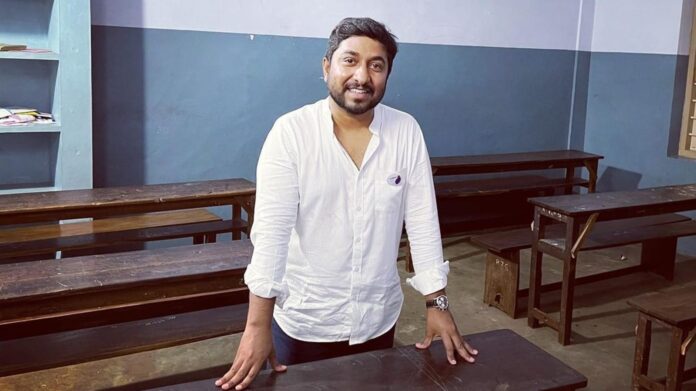Vineeth Sreenivasan is not just a popular name in the Malayalam film industry but in numerous other states as well. Being the son of veteran Malayalam actor, director and producer Sreenivasan, Vineeth has literally grown up in the south film industry. Today, he has proved himself not just as a talented actor and writer but also a notable director and singer. Also read | Varshangalkku Shesham review: Vineeth Sreenivasan’s tale of friendship is earnest but melodramatic
From 2008 when he made his acting debut in Cycle, to 2024 where he has delivered a directorial hit with Varshangalkku Sesham, Vineeth puts his unique stamp of authenticity on every film of his whether he is acting, writing or directing it.
In this exclusive chat with Hindustan Times, Vineeth Sreenivasan talks about his latest film, its success and more.
Varshangalkku Sesham is quite different from your previous films – all about cinema and nostalgia. Is it your father, Sreenivasan (Malayalam actor, director, producer and writer) and your growing up years in the industry that inspired it?
The first half of the film is based on a lot of memories that inspired me – in my formative years, I’ve heard a lot of stories (many humorous) from like my father, Innocent uncle, Nedumudi Venu uncle and others, about the film industry in the 70s and 80s, life in Kodambakkam (Chennai) and their struggle for survival. These stories had a lot of impact on me. I thought there was so much humor even when they were struggling to make something out of their lives. I also used to read these Malayalam magazines like Nana, Vellinakshatram and Chithrabhumi that used to have stories about Kodambakkam and cinema. And the second half of the film is a reflection on contemporary Malayalam cinema and the experiences that we have. I combined these two elements – the memories and the present.
When did you get the idea for the film?
I have been thinking about this story since 2006. I was in my final year of college and this story has been in my head since then. I was a little hesitant to make it because it involves a lot of work, like building the sets, and there are so many characters. Whatever you see, especially in the first half, is what we have created – we literally recreated Kodambakkam, the streets and the studios. None of it was shot in Chennai – we shot in Coimbatore, Pollachi and Kerala.
It feels like we’re watching two films – one set in the past in the first half and another in the present in the second. Was that a deliberate attempt?
I have been trying that style right from the time of Oru Vadakkan Selfie where the treatment of the first half and second half are completely different. I did this with Hridayam also – the first half is campus life and the second is set later in life. In this film, it is more distinct because it’s set in two different eras. The first half takes place in the 70s and all that I have narrated is based on my imagination – right from the sets to the way the characters are. That is a fantasy period for me. The present I can relate to because I am part of the film industry today. Like you can troll yourself and the way you look at it is totally different. Our times are different and their times were different
What was the reasoning behind casting your own brother, Dhyan Sreenivasan, as Venu?
I had worked with Dhyan in my third film, Thira, and I’m working with him now after 11 years. For me, the most interesting aspect was the combination of Dhyan and Appu (Pranav Mohanlal) on screen – their personalities are in stark contrast and they are extremely different. I’ve always felt that Pranav is an actor who can be explored a lot more. So, when you combine these two completely opposite people with different personality traits, then I thought some magic can happen on screen. Plus, we are setting it in the 70s and it’s about the struggles of people who wanted to make it in the industry. Naturally, when I’m making a film like this, people would associate this with Mohanlal, Sreenivasan and their peers. Thus, even before even watching the film, I have a chance to set the audience’s mind in that world. And this casting really helps. Even the others like Shaan Rahman and Aju Varghese will bring to mind people who worked in the industry at that time.
You wrote and directed this film and have done a cameo. But why didn’t you think of acting as Venu?
No. When I’m directing, and not acting, then I can focus a lot more on that. The only reason I did that cameo is because, in the end, he says that this is your film and you should watch it. I thought it’ll be a nice way to culminate the whole thing. In fact, I had asked my producer if my good friend director Alphonse Puthren could play that taxi driver cameo but he felt that it would be better if that dialogue came from me during the climax. It was a great opportunity to share screen space with Dhyan and Appu in one frame. For me, it’s a memory that I’ll cherish forever. For me it’s not just about making films, it’s about making memories with friends and it becomes a little personal also.
Is Varshangalkku Sesham perhaps close to your heart?
One of the closest for sure! Hridayam is also like that because it had a lot of recollections from my campus life. Thattathin Marayathu had a lot of recollections from my formative years like when I was growing up in Kerala and studied until my 10th standard.
Most of the cast members in this film are good friends of yours.
There were parts that actually fit them. There were so many characters and I could totally see all these people fitting into that. For instance, Basil plays an assistant director and he was my assistant director earlier and the audience knows that. So that character is established the moment he comes on screen. When I cast Nivin Pauly as an actor, from the first scene itself, people will buy that. Everyone was bringing their image along for the role.
Nivin Pauly was excellent in the film. How did you zero in on him?
I’m working with Nivin after 11 years. There is a streak of madness that that character demands. Nivin has the courage and chops to pull off something over the top. Even Fahad can do something over the top and totally walk away with all the glory. And Nivin is also in that space. He can totally grab eyeballs and convince people that this is true. Whatever conversation that he has in the hotel room, that fourth wall thing, you need an actor who can make it believable. And with all the trolling that Nivin has gone through in real life, when he says those things, it has that strength. It’s coming from somebody who has gone through that. This would resonate with the audience. I don’t think anyone else can be cast for that role.
There is talk that you have resurrected Nivin’s career with the role of Nithin Molly.
I mean every star has a career graph and journey. They have a phase where everything will go well for them, then there is a downside. That has been the history with every actor. Nivin, anytime, any day, if he’s playing something to his strength, he can shine all the time.
Some of the reviews for the film were mixed. Do reviews bother you?
We are all happy when we have great reviews. However, I have never had unanimous reviews in my career. (Smiles) I have never made a film that has made everyone happy. But most of my films have worked at the box office. So as long as my films work at the box office, I think that’s good. I can without any guilt, move on to the next one and my producer is very happy. And a large part of the audience is happy. But when I get criticisms, I look at what can be done better for the next film. Everything is a learning. If you tell me that a certain part is not working for you, I’m going to listen to you because it’s going to help me for my next. As long as it’s working at the box office, the criticism is not going to affect one’s career. But this criticism is important because you want to learn something from it. For the next one, you are not going to make the same mistakes. You’ll probably make new mistakes. And then they’ll point it out. It’s a journey and not the end.
What is next for you?
I’m going to start my work for my next directorial. I have one ready-to-release film as an actor. And I have committed to one film that’s directed by my assistant director, Dhananjay Shankar, in which Dileep is playing the lead and my brother is also in the film.
Anything you can tell us about your directorial?
I think it’ll be an action film because I haven’t explored that genre yet. I’m still working on the script and I’m collaborating with a writer this time. I have been inspired by so many films starring Jackie Chan, Sylvester Stallone, Van Damme, Arnold Schwarzenegger and Jason Statham. Even films like John Wick.
Malayalam films, including yours, have become hits across India, not just Kerala. Do you still make films primarily for the Malayalam audience?
Definitely for the Malayalam audience primarily. I always believe that if you make films for your people, it will resonate with the rest of the audience. Because it will be true to them and true to the world that you are living in. That’s all people want to see. They want to see authentic films. And there are a lot of directors in Malayalam who are capable of doing it, who are learning constantly, improving themselves constantly. I’m expecting a lot of filmmakers to do bigger and better films, for sure.


